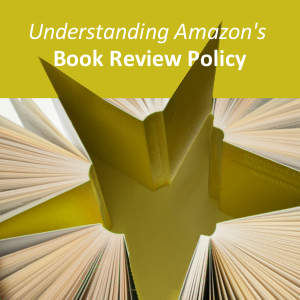Amazon customer reviews are undeniably important to independent authors. They affect your star rating. They affect whether or not readers choose to purchase your book. They are used in determining if you qualify for certain promotional websites, such as BookBub. They may even affect how prominently Amazon features your book on their site. With so much riding on Amazon customer reviews, it is critical as an author to know what is allowed – and what is not – before you put forth effort in pursuing reviews.
What is Not Allowed
Amazon’s Customer Reviews guidelines clearly state that they “don’t allow and will remove” a review by “someone perceived to have a close personal relationship with the product’s owner, author, or artist.” And their Community Guidelines add that customers may not post reviews of their “relative’s, close friend’s, business associate’s, or employer’s products or services.” Thus, when seeking book reviews, you probably shouldn’t ask your friends, coworkers, or family members to review your book. Not that a friend of yours won’t try to provide a review of your book, and if they do, Amazon may or may not notice. However, as an author, you should not seek reviews from anyone that you have a preexisting relationship with. Frequent reviews of this type might lead to the removal of reviews or even being banned from reviewing.
Amazon’s Community Guidelines also state that you may not post reviews “in exchange for compensation of any kind.” Thus, steer clear of any website that charges for Amazon customer reviews. This is notably different, however, from sites that may charge for an editorial review that is posted in the editorial review section and not in the customer review section, which is allowed by Amazon.
Also disallowed is “requesting compensation in exchange for” reviews. This means that you should avoid review exchanges with other authors, as doing so obligates them to provide you with a review. Some services offer ‘snaps’ or other virtual compensation for reviews. While the compensation rule still applies, by never pairing authors with each other, some authors may feel such services are safe to use. I can’t speak for Amazon’s interpretation of compensation or their ability to track such review trades, but personally, I would at least recommend proceeding with extreme caution with these types of services!
The reason that Amazon imposes these restrictions is obvious – to protect the integrity of customer reviews. What parent is going to give an unbiased review of their child’s book? And many authors involved in review exchanges would gladly pad a review, hoping the reciprocating author does likewise. With so many restrictions on customer reviews, how would an author go about getting more reviews?
What is Allowed


The term “customer reviews” speaks for itself. These reviews are provided by individuals that are customers of that product, or in the case of books, readers of that book. They are not a friend, and are not bartering or getting paid for a review, but they are simply customers that read a book and choose to provide a review of it. With that in mind, how can you get customer reviews?
Amazon’s Community Guidelines make one noteworthy exception for authors, allowing them to “provide free or discounted copies of their books to readers, as long as the author or publisher does not require a review in exchange or attempt to influence the review.” This means that you can offer free books to book bloggers. Book bloggers enjoy reading, and they enjoy sharing their opinions of the books they read. There are several indie book reviewer directories online that can help you get in touch with hundreds of such bloggers.
Marketing is also very important. Ask yourself: Do I have a book cover that looks professional and fits my genre? Is my book’s summary captivating and free from grammatical errors? Have I filled out my author’s biography? Have I selected the best keywords and the correct genres when entering my book information on KDP? Do I have any additional marketing materials I could add to my Amazon page, such as editorial reviews, book trailers, or awards? Do I have a website, a newsletter, and social media pages for myself and my books? Doing these types of things can make your book more attractive to customers and can help you develop a fan base.
Just like any other product that you might want to sell, you can promote your book with advertising. Some authors have advertised on Google, Facebook, Amazon, etc., while others may find it more affordable to look for smaller book blogs and websites to advertise directly on. Amazon’s KDP program allows you to discount your book or offer it for free, which attracts new customers to your book and may lead to reviews. There are also many sites, some free and some paid, that will promote free or discounted books to their subscribers, such as Indies Unlimited’s Thrifty Thursday posts. As with book reviewers, directories of book promotion sites are also available online.
By obtaining customer reviews in an honest and ethical way, you will contribute to your book’s success, while at the same time following all the rules and guidelines that Amazon has set in place.
* All quotations of Amazon’s Community Guidelines were taken in May, 2020. Amazon may change their wording or their rules at any time, and you can check their current guidelines here and here.







